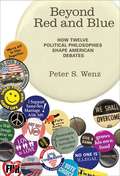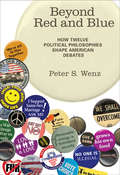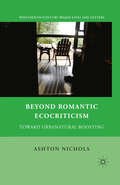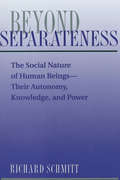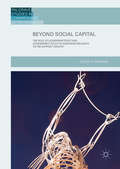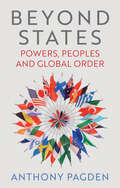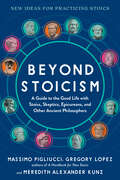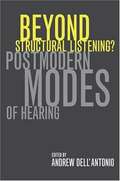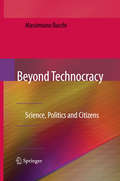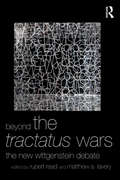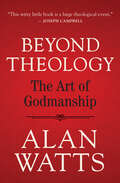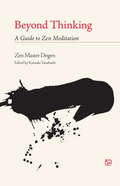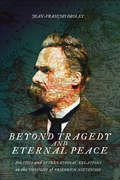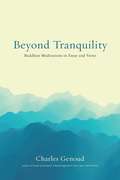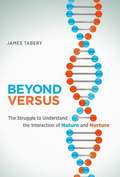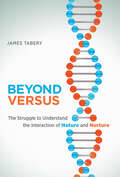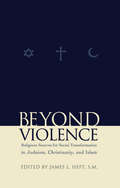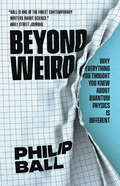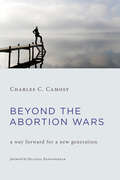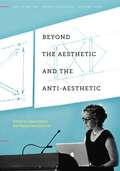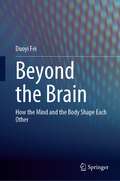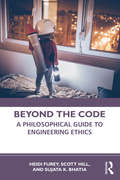- Table View
- List View
Beyond Red and Blue: How Twelve Political Philosophies Shape American Debates
by Peter S. WenzOn any given night cable TV news will tell us how polarized American politics is: Republicans are from Mars, Democrats are from Canada. But in fact, writes Peter Wenz in Beyond Red and Blue,Americans do not divide neatly into two ideological camps of red/blue, Republican/Democrat, right/left. If they did, what could explain Republicans who oppose the Patriot Act and support gay marriage, or liberals and conservatives who agree over genetic engineering? In real life, as Wenz shows, different ideologies can converge on certain issues; people from the right and left can support the same policy for different reasons. Thus, for example, libertarian-leaning Republicans can oppose the Patriot Act's encroachment on personal freedom and social conservatives can support gay marriage on the grounds that it strengthens the institution of marriage; liberals might oppose genetic engineering on environmental grounds, conservatives on religious grounds. Wenz maps out twelve political philosophies--ranging from theocracy and free-market conservatism to feminism and cosmopolitanism--on which Americans draw when taking political positions. He then turns his focus to some of America's most controversial issues and, through in-depth discussions of fourteen of them, shows how ideologically diverse coalitions can emerge. These hot-button issues include extending life by artificial means (as in the Terry Schiavo case); the war on drugs; the war on terrorism; affirmative action; abortion; same-sex marriage; healthcare; immigration; and globalization. Awareness of these twelve political philosophies, Wenz argues, can help activists enlist allies, citizens better understand politics and elections, and all of us define our own political identities.
Beyond Red and Blue: How Twelve Political Philosophies Shape American Debates
by Peter S. WenzWhy Americans do not divide neatly into red and blue or right and left but form coalitions across party lines on hot-button issues ranging from immigration to same-sex marriage.On any given night cable TV news will tell us how polarized American politics is: Republicans are from Mars, Democrats are from Canada. But in fact, writes Peter Wenz in Beyond Red and Blue, Americans do not divide neatly into two ideological camps of red/blue, Republican/Democrat, right/left. In real life, as Wenz shows, different ideologies can converge on certain issues; people from the right and left can support the same policy for different reasons. Thus, for example, libertarian-leaning Republicans can oppose the Patriot Act's encroachment on personal freedom and social conservatives can support gay marriage on the grounds that it strengthens the institution of marriage.Wenz maps out twelve political philosophies—ranging from theocracy and free-market conservatism to feminism and cosmopolitanism—on which Americans draw when taking political positions. He then turns his focus to some of America's most controversial issues and shows how ideologically diverse coalitions can emerge on such hot-button topics as extending life by artificial means, the war on drugs, the war on terrorism, affirmative action, abortion, same-sex marriage, health care, immigration, and globalization.Awareness of these twelve political philosophies, Wenz argues, can help activists enlist allies, citizens better understand politics and elections, and all of us define our own political identities.
Beyond Romantic Ecocriticism: Toward Urbanatural Roosting (Nineteenth-Century Major Lives and Letters)
by Ashton NicholsNichols chronicles the Enlightenment view of 'Nature' as static and separate from humans as it moved towards the Romantic 'nature' characterized by dynamic links among all living things. Engaging Romantic and Victorian thinkers, as well as contemporary scholarship, he draws new conclusions about 21st-century ideas of nature.
Beyond Separateness: The Social Nature Of Human Beings--their Autonomy, Knowledge, And Power
by Richard SchmittIn this ambitious and original book, Richard Schmitt moves beyond the current dominant assumption that human beings are essentially separate from one another. In so doing, he provides an understanding of how we can be in some ways autonomous beings with individual rights and at the same time essentially social beings who can be understood only in terms of our social relations.
Beyond Social Capital: The Role of Leadership, Trust and Government Policy in Northern Ireland's Victim Support Groups (Palgrave Studies in Compromise after Conflict)
by Laura K. GrahamDrawing on lessons from civil society in Northern Ireland, Beyond Social Capital examines the limitations of social capital theory in deeply divided societies. It draws on an ethnographic study of victim support groups and evidence drawn from policymakers in Northern Ireland to reconceptualize the traditional bonding-bridging distinction. The role of leadership is particularly examined, as the book highlights the complex and compelling ways in which leadership supports and shapes the activities, practices and motivations of the victim self-help industry in Northern Ireland. The multiple dimensions of this industry are explored, including: social and victim policy; private, statutory, and voluntary sector collaboration; the political motivations of victim support groups, and; the types of social capital being built in victim groups and the impact that this social capital has on victims and wider elements of the peace process. Importantly, Laura K. Graham challenges the prevailing notion that all forms of social capital are inherently good for civic organizations and associational life. Instead, a new form of social capital existing in divided and post-conflict societies is advanced. This form of social capital, called 'dysfunctional bonding', may have negative impacts, causing distrust within and outside a group and can be particularly problematic for those traumatized by political conflict. With international relevance, this book will be of great interest to those working in post-conflict studies as well as victim studies.
Beyond States: Powers, Peoples and Global Order
by Anthony PagdenToday, the majority of the peoples of the planet live in nation-states, based upon the idea, if never the reality, of a single people, a single culture, a single rule of law and a single source of sovereign authority. But will they continue to do so in the future? None of the major challenges that confront humanity today – from climate change to disease, from terrorism to mass migration – can be handled effectively by single nation-states, no matter how powerful. The world is no longer made up only of states but also of an ever-increasing multitude of interstate networks and organizations which recognize no borders. We are beginning to be able to imagine the very real possibility of a new global civil society. But what political form should this take? By examining the history of the evolution of human society from the world’s first empires to today’s world of interstate networks, this book argues that there now exists the possibility of the emergence of a new political form, a global ‘federation of federations’, that will bring the species closer to the possibility of a more harmonious, equitable and secure future.
Beyond Stoicism: A Guide to the Good Life with Stoics, Skeptics, Epicureans, and Other Ancient Philosophers
by Massimo Pigliucci Gregory Lopez Meredith Alexander KunzNavigate the challenges of modern life, with ancient and time-tested Greek and Roman thinkers at your side. What is a good life? And how can we create that life in a world filled with uncertainty? Beyond Stoicism invites you to find your own answers to these big questions with help from thirteen of the most prominent Greco-Roman philosophers—many of whom inspired, or were inspired by, the Stoics. By taking cues from the lives and ideas of the Cynics, Epicureans, and others, you’ll learn to: Seek pleasure with Aristippus Strike the right balance with Aristotle Focus on what’s up to you with Epictetus Be a rebel like Hipparchia Embrace uncertainty with Carneades Question everything with Socrates Work toward a just society with Plato And much more Times have changed, but the quest for eudaimonia—a life worth living—stays the same: We still seek pleasure and crave love, avoid pain and fear death. That’s why all these ancient sages can continue to guide us, practicing Stoics and new seekers alike. With exercises to help you test-drive each philosophy today
Beyond Structural Listening? Postmodern Modes of Hearing
by Andrew Dell'AntonioIn a highly influential essay, Rose Rosengard Subotnik critiques "structural listening" as an attempt to situate musical meaning solely within the unfolding of the musical structure itself. The authors of this volume, prominent young music historians and theorists writing on repertories ranging from Beethoven to MTV, take up Subotnik's challenge in what is likely to be one of musical scholarship's intellectual touchstones for many years to come. Original, innovative, and sophisticated, their essays explore not only the implications of the "structural listening" model but also the alternative listening strategies that have developed in specific communities, often in response to twentieth-century Western music.
Beyond Technocracy: Science, Politics and Citizens
by Adrian Belton Massimiano Bucchi"Will the ordinary man become a scientist?...Bucchi exposes the inadequacy of the 'technochratic model' but also the weaknesses of contemporary bioethics when facing the increasing dilemmas posed by science and technology to contemporary society." -Il Corriere della Sera [Italian leading newspaper] "Bucchi provides a clear, rigorous and accessible discussion - often enriched by a subtle irony - of complex and ambiguous issues, showing that science and innovation are not neutral terrains, but rather among the key conflictual contexts in which contemporary social and political changes take place." -Italian Review of Sociology "A dense but accessible book...Bucchi acutely describes the shortcomings of the technocratic and ethical responses to the contemporary dilemmas of science and technology." -Italian Edition of the New York Review of Books Nuclear energy, stem cell technology, GMOs: the more science advances, the more society seems to resist. But are we really watching a death struggle between opposing forces, as so many would have it? Can today's complex technical policy decisions coincide with the needs of a participatory democracy? Are the two sides even equipped to talk to each other? Beyond Technocracy: Science, Politics and Citizens answers these questions with clarity and vision. Drawing upon a broad range of data and events from the United States and Europe, and noting the blurring of the expert/lay divide in the knowledge base, the book argues that these conflicts should not be dismissed as episodic, or the outbursts of irrationality and ignorance, but recognized as a critical opportunity to discuss the future in which we want to live. Massimiano Bucchi's analysis covers the complex realities of post-academic science as he: Explores the widely debated theme of science and democracy across a broad range of technological controversies. Overviews issues raised by the current relationship among scientists, policymakers, business interests, and the public. Dispels stereotypes of the detached scientific community versus the uninformed general public. Examines the role of the media in framing scientific debate. Addresses the question of how to move beyond technocracy to a more fruitful collaboration between scientists and citizens. Offers a bold vision for a future in which the scientific and public spheres regard each other as partners working toward a shared purpose. Beyond Technocracy: Science, Politics and Citizens has great value as a postgraduate text for courses in technology and society, political science, and science policy. It will also find an interested audience among scientists, policymakers, managers in the technological sector, and concerned lay readers. "In his brilliant new book, Beyond Technocracy: Science, Politics and Citizens, Massimiano Bucchi opens for the reader the Pandora's box of the complex relationship between scientists and citizens in contemporary, democratic societies. With major corporations owning university labs and academic researchers (and their institutions) pocketing millions (literally) from the proceedings of patents resulting from their scientific work, Bucchi analyzes the implications of contrasting drives toward for-profit and open science, private and public science. Without pulling his punches, and without hiding behind easy, popular solutions, Bucchi clearly lays out the choices we face when confronted with a science whose potential societal impact - positive and negative - is becoming ever greater (e.g., nuclear energy, genetically modified foods, genetic engineering). Based on a wealth of empirical evidence and case studies, the book is extremely accessible and well written, making it an ideal introduction to the issues. I would highly recommend it to specialists and non-specialists alike!" -Roberto Franzosi, Professor in Department of Sociology at Emory University
Beyond The Tractatus Wars: The New Wittgenstein Debate
by Rupert Read Matthew A. LaveryOver fifteen years have passed since Cora Diamond and James Conant turned Wittgenstein scholarship upside down with the program of “resolute” reading, and ten years since this reading was crystallized in the major collection The New Wittgenstein. This approach remains at the center of the debate about Wittgenstein and his philosophy, and this book draws together the latest thinking of the world’s leading Tractatarian scholars and promising newcomers. Showcasing one piece alternately from each “camp”, Beyond the Tractatus Wars pairs newly commissioned pieces addressing differing views on how to understand early Wittgenstein, providing for the first time an arena in which the debate between “strong” resolutists, “mild” resolutists and “elucidatory” readers of the book can really take place. The collection includes famous “samizdat” essays by Warren Goldfarb and Roger White that are finally seeing the light of day.
Beyond Theology: The Art of Godmanship
by Alan WattsA radical reinterpretation of Christianity by one of the twentieth century’s leading philosophers Today, Alan Watts is remembered mainly as an eloquent interpreter of Eastern philosophies such as Taoism and Zen Buddhism. Not everyone knows that Watts was also a formidable scholar of Christianity who worked as an Episcopal chaplain early in his career. He eventually left the church to find his own spiritual path, but his time there fueled a burst of literary creativity that culminated in Beyond Theology, originally published in 1964 and now back in print. In this landmark work, Watts asks whether a “rigorous, imperious, and invincibly self-righteous” religion such as Christianity can stay relevant in our modern, multicultural world. To answer that question, he deconstructs Christianity by using concepts borrowed from psychology, linguistics, science, and Eastern philosophy. In the process, he solves difficult problems of theology, traces the impact of Christianity on Western culture, and points the way to a new form of nondualistic spirituality. Playing the role of a philosophical jester, Watts artfully deploys paradoxes, riddles, and gently subversive humor to overturn conventional wisdom. His intention is not to hold sacred things up to ridicule but rather to expand our definition of the sacred. The ultimate aim is to help us see beyond the external trappings of religion — beyond ritual, myth, doctrine, and theology itself — to experience the divine within ourselves.
Beyond Thinking: A Guide to Zen Meditation
by DogenSpiritual practice is not some kind of striving to produce enlightenment, but an expression of the enlightenment already inherent in all things: Such is the Zen teaching of Dogen Zenji (1200-1253) whose profound writings have been studied and revered for more than seven hundred years, influencing practitioners far beyond his native Japan and the Soto school he is credited with founding. In focusing on Dogen's most practical words of instruction and encouragement for Zen students, this new collection highlights the timelessness of his teaching and shows it to be as applicable to anyone today as it was in the great teacher's own time. Selections include Dogen's famous meditation instructions; his advice on the practice of zazen, or sitting meditation; guidelines for community life; and some of his most inspirational talks. Also included are a bibliography and an extensive glossary.
Beyond Tragedy and Eternal Peace: Politics and International Relations in the Thought of Friedrich Nietzsche (McGill-Queen's Studies in the History of Ideas)
by Jean-François DroletAs a German philosopher, cultural critic, composer, poet, philologist, and scholar of Latin and Greek, Friedrich Wilhelm Nietzsche has exerted a profound influence on modern intellectual history. Beyond Tragedy and Eternal Peace provides an overview of his legacy, highlighting the synergy between his critique of metaphysics and his reflections on the politics and international relations of the late nineteenth century.Jean-François Drolet exposes and analyzes Nietzsche's account of the political processes, institutions, and dominant ideologies shaping public life in Germany and Europe during the 1870s and 1880s. Nietzsche anticipated a new kind of politics, borne out of such events as the Franco-Prussian War, the unification of Germany under Bismarck, the advent of mass democracy, and the rise and transformation of European nationalism. Focusing on conflict and political violence, Drolet expertly reconstructs Nietzsche's fierce and continued critique of the nationalist, liberal, and socialist ideologies of his age, which the philosopher believed failed to grapple with the death of God and the crisis of European nihilism it engendered.As this reconstructive interpretation reveals, Nietzsche's philosophy offers a powerful and still greatly underappreciated reckoning with the changing political practices, norms, and agencies that led to the momentous collapse of the European society of states during the early twentieth century.
Beyond Tragedy: Essays on the Christian Interpretation of History
by Reinhold NiebuhrThis book is intended to present Niebuhr's ideas about "Christian Realism" in a way thatwill be useful to people who are thinking about today's social issues.
Beyond Tranquility: Buddhist Meditations in Essay and Verse
by Charles GenoudOne of Buddhism&’s most respected authors inspires readers with a creative and intriguing journey into the heart of Buddhist meditation practice.Beyond Tranquility is an invitation to inner experience. In these pages, one of Buddhism&’s most respected scholar-sages creatively distills decades of practice, reflection, and teaching into essential truths. Touching on the full scope of core Buddhist philosophical and meditation traditions, Charles Genoud draws on ancient Buddhist suttas, masters like Nagarjuna and Dogen, and even seers and philosophers such as Eckhart, Nietzsche, and Sartre, as well as the great innovators of the modern novel and modern dance. Weaving together the wisdom of these great minds in a poetic style uniquely his own, Genoud invites you into the heart of Buddhist meditation and practice. Here, with the immediacy and wry humor of haiku, he proves an astute and subtle guide to the pitfalls and paradoxes that eventually confront every meditator, and to the most skillful ways through them. Genoud&’s powerful, experiential language transmits the meditative experience rather than merely describing it—and his style will resonate with the teachings of Zen and Dzogchen, the writings of contemplative philosophers, and with dancers and other artists whose work is built upon a &“body of presence.&”
Beyond Versus
by James TaberyIf everyone now agrees that human traits arise not from nature or nurture but from the interaction of nature and nurture, why does the "nature versus nurture" debate persist? In Beyond Versus, James Tabery argues that the persistence stems from a century-long struggle to understand the interaction of nature and nurture -- a struggle to define what the interaction of nature and nurture is, how it should be investigated, and what counts as evidence for it. Tabery examines past episodes in the nature versus nurture debates, offers a contemporary philosophical perspective on them, and considers the future of research on the interaction of nature and nurture. From the eugenics controversy of the 1930s and the race and IQ controversy of the 1970s to the twenty-first-century debate over the causes of depression, Tabery argues, the polarization in these discussions can be attributed to what he calls an "explanatory divide" -- a disagreement over how explanation works in science, which in turn has created two very different concepts of interaction. Drawing on recent developments in the philosophy of science, Tabery offers a way to bridge this explanatory divide and these different concepts integratively. Looking to the future, Tabery evaluates the ethical issues that surround genetic testing for genes implicated in interactions of nature and nurture, pointing to what the future does (and does not) hold for a science that continues to make headlines and raise controversy.
Beyond Versus: The Struggle to Understand the Interaction of Nature and Nurture (Life and Mind: Philosophical Issues in Biology and Psychology)
by James TaberyWhy the “nature versus nurture” debate persists despite widespread recognition that human traits arise from the interaction of nature and nurture.If everyone now agrees that human traits arise not from nature or nurture but from the interaction of nature and nurture, why does the “nature versus nurture” debate persist? In Beyond Versus, James Tabery argues that the persistence stems from a century-long struggle to understand the interaction of nature and nurture—a struggle to define what the interaction of nature and nurture is, how it should be investigated, and what counts as evidence for it. Tabery examines past episodes in the nature versus nurture debates, offers a contemporary philosophical perspective on them, and considers the future of research on the interaction of nature and nurture. From the eugenics controversy of the 1930s and the race and IQ controversy of the 1970s to the twenty-first-century debate over the causes of depression, Tabery argues, the polarization in these discussions can be attributed to what he calls an “explanatory divide”—a disagreement over how explanation works in science, which in turn has created two very different concepts of interaction. Drawing on recent developments in the philosophy of science, Tabery offers a way to bridge this explanatory divide and these different concepts integratively. Looking to the future, Tabery evaluates the ethical issues that surround genetic testing for genes implicated in interactions of nature and nurture, pointing to what the future does (and does not) hold for a science that continues to make headlines and raise controversy.
Beyond Violence: Religious Sources of Social Transformation in Judaism, Christianity, and Islam (Abrahamic Dialogues)
by James L. HeftIn an age of terrorism and other forms of violence committed in the name of religion, how can religion become a vehicle for peace, justice, and reconciliation? And in a world of bitter conflicts-many rooted in religious difference-how can communities of faith understand one another?The essays in this important book take bold steps forward to answering these questions. The fruit of a historic conference of Jewish, Christian, and Muslim scholars and community leaders, the essays address a fundamental question: how the three monotheistic traditions can provide the resources needed in the work of justice and reconciliation.Two distinguished scholars represent each tradition. Rabbis Irving Greenberg and Reuven Firestone each examine the relationship of Judaism to violence, exploring key sources and the history of power, repentance, and reconciliation. From Christianity, philosopher Charles Taylor explores the religious dimensions of "categorical" violence against other faiths, other groups, while Scott Appleby traces the emergence since Vatican II of nonviolence as a foundation of Catholic theology and practice. Mustafa Ceric, Grand Mufti of Bosnia, discusses Muslim support of pluralism and human rights, and Mohamed Fathi Osman examines the relationship between political violence and sacred sources in contemporary Islam.By focusing on transformative powers of Judaism, Christianity, and Islam, the essays in this book provide new beginnings for people of faith committed to restoring peace among nations through peace among religions.
Beyond Weird: Why Everything You Thought You Knew about Quantum Physics Is Different
by Philip BallA journey into the mysteries and meaning of quantum theory: “Gorgeously lucid text . . . easily the best book I’ve read on the subject.” —The Washington Post“Anyone who is not shocked by quantum theory has not understood it.” Since Niels Bohr said this many years ago, quantum mechanics has only been getting more shocking. We now realize that it’s not really telling us that “weird” things happen out of sight, on the tiniest level, in the atomic world: rather, everything is quantum. But if quantum mechanics is correct, what seems obvious and right in our everyday world is built on foundations that don’t seem obvious or right at all—or even possible.An exhilarating tour of the contemporary quantum landscape, Beyond Weird is a book about what quantum physics really means—and what it doesn’t. Philip Ball offers an up-to-date, accessible account of the quest to come to grips with the most fundamental theory of physical reality, and to explain how its counterintuitive principles underpin the world we experience. Over the past decade it’s become clear that quantum physics is less a theory about particles and waves, uncertainty and fuzziness, than a theory about information and knowledge—about what can be known, and how we can know it. Discoveries and experiments over the past few decades have called into question the meanings and limits of space and time, cause and effect, and, ultimately, of knowledge itself. The quantum world Ball shows us isn’t a different world. It is our world, and if anything deserves to be called “weird,” it’s us.“Weighs up the competing interpretations, and the misconceptions, that have attached themselves to quantum theory in its 100-year history. . . . [A] laudable achievement.”—Sunday Times“Ball is one of the finest contemporary writers about science. . . . His prose is a pleasure to read.”—Wall Street Journal
Beyond the Abortion Wars: A Way Forward for a New Generation
by Charles C. CamosyCuts through the mass confusion surrounding abortion and lays out solid common ground The abortion debate in the United States is confused. Ratings-driven media coverage highlights extreme views and creates the illusion that we are stuck in a hopeless stalemate. In this book Charles Camosy argues that our polarized public discourse hides the fact that most Americans actually agree on the major issues at stake in abortion morality and law. Unpacking the complexity of the abortion issue, Camosy shows that placing oneself on either side of the typical polarizations -- pro-life vs. pro-choice, liberal vs. conservative, Democrat vs. Republican -- only serves to further confuse the debate and limits our ability to have fruitful dialogue. Camosy then proposes a new public policy that he believes is consistent with the beliefs of the broad majority of Americans and supported by the best ideas and arguments about abortion from both secular and religious sources.
Beyond the Aesthetic and the Anti-Aesthetic (The Stone Art Theory Institutes)
by James Elkins Harper MontgomeryEach of the five volumes in the Stone Art Theory Institutes series, and the seminars on which they are based, brings together a range of scholars who are not always directly familiar with one another’s work. The outcome of each of these convergences is an extensive and “unpredictable conversation” on knotty and provocative issues about art. This fourth volume in the series, Beyond the Aesthetic and the Anti-Aesthetic, focuses on questions revolving around the concepts of the aesthetic, the anti-aesthetic, and the political. The book is about the fact that now, almost thirty years after Hal Foster defined the anti-aesthetic, there is still no viable alternative to the dichotomy between aesthetics and anti- or nonaesthetic art. The impasse is made more difficult by the proliferation of identity politics, and it is made less negotiable by the hegemony of anti-aesthetics in academic discourse on art. The central question of this book is whether artists and academicians are free of this choice in practice, in pedagogy, and in theory.The contributors are Stéphanie Benzaquen, J. M. Bernstein, Karen Busk-Jepsen, Luis Camnitzer, Diarmuid Costello, Joana Cunha Leal, Angela Dimitrakaki, Alexander Dumbadze, T. Brandon Evans, Geng Youzhuang, Boris Groys, Beáta Hock, Gordon Hughes, Michael Kelly, Grant Kester, Meredith Kooi, Cary Levine, Sunil Manghani, William Mazzarella, Justin McKeown, Andrew McNamara, Eve Meltzer, Nadja Millner-Larsen, Maria Filomena Molder, Carrie Noland, Gary Peters, Aaron Richmond, Lauren Ross, Toni Ross, Eva Schürmann, Gregory Sholette, Noah Simblist, Jon Simons, Robert Storr, Martin Sundberg, Timotheus Vermeulen, and Rebecca Zorach.
Beyond the Aesthetic and the Anti-Aesthetic: Beyond The Aesthetic And Anti-aesthetic (The Stone Art Theory Institutes #4)
by James Elkins Harper MontgomeryEach of the five volumes in the Stone Art Theory Institutes series, and the seminars on which they are based, brings together a range of scholars who are not always directly familiar with one another’s work. The outcome of each of these convergences is an extensive and “unpredictable conversation” on knotty and provocative issues about art. This fourth volume in the series, Beyond the Aesthetic and the Anti-Aesthetic, focuses on questions revolving around the concepts of the aesthetic, the anti-aesthetic, and the political. The book is about the fact that now, almost thirty years after Hal Foster defined the anti-aesthetic, there is still no viable alternative to the dichotomy between aesthetics and anti- or nonaesthetic art. The impasse is made more difficult by the proliferation of identity politics, and it is made less negotiable by the hegemony of anti-aesthetics in academic discourse on art. The central question of this book is whether artists and academicians are free of this choice in practice, in pedagogy, and in theory.The contributors are Stéphanie Benzaquen, J. M. Bernstein, Karen Busk-Jepsen, Luis Camnitzer, Diarmuid Costello, Joana Cunha Leal, Angela Dimitrakaki, Alexander Dumbadze, T. Brandon Evans, Geng Youzhuang, Boris Groys, Beáta Hock, Gordon Hughes, Michael Kelly, Grant Kester, Meredith Kooi, Cary Levine, Sunil Manghani, William Mazzarella, Justin McKeown, Andrew McNamara, Eve Meltzer, Nadja Millner-Larsen, Maria Filomena Molder, Carrie Noland, Gary Peters, Aaron Richmond, Lauren Ross, Toni Ross, Eva Schürmann, Gregory Sholette, Noah Simblist, Jon Simons, Robert Storr, Martin Sundberg, Timotheus Vermeulen, and Rebecca Zorach.
Beyond the Analytic-Continental Divide: Pluralist Philosophy in the Twenty-First Century (Routledge Studies in Contemporary Philosophy)
by Andrew Cutrofello Jeffrey A. Bell Paul M. LivingstonThis forward-thinking collection presents new work that looks beyond the division between the analytic and continental philosophical traditions—one that has long caused dissension, mutual distrust, and institutional barriers to the development of common concerns and problems. Rather than rehearsing the causes of the divide, contributors draw upon the problems, methods, and results of both traditions to show what post-divide philosophical work looks like in practice. Ranging from metaphysics and philosophy of mind to political philosophy and ethics, the papers gathered here bring into mutual dialogue a wide range of recent and contemporary thinkers, and confront leading problems common to both traditions, including methodology, ontology, meaning, truth, values, and personhood. Collectively, these essays show that it is already possible to foresee a future for philosophical thought and practice no longer determined neither as "analytic" nor as "continental," but, instead, as a pluralistic synthesis of what is best in both traditions. The new work assembled here shows how the problems, projects, and ambitions of twentieth-century philosophy are already being taken up and productively transformed to produce new insights, questions, and methods for philosophy today.
Beyond the Brain: How the Mind and the Body Shape Each Other
by Duoyi FeiDifferent from traditional research on the mind-body problem often discussed from an epistemological viewpoint, which assumes that mental processes are internal to the person, this book demonstrates the crucial role of contextual relevance in the workings of the mind and illustrates how mind emerges from the individual's interactions with her physical, social, and cultural environments. It also develops the interpersonal and social aspects of embodied mind. The body that creates meaning is not only an emotional, kinesthetic, and aesthetically experiencing body; the body that creates meaning is a social body. It suggests that mind-body relations are not only achieved through the interaction between our own mind and body, but by other minds in our intersubjective interactions. It is related to epistemology, metaphysics, ethics, value theory, action theory, and the philosophies of mind, science, logic, and technology. The readership may include graduate and undergraduate students studying philosophy, law, political science, sociology, psychology, etc., educators, researchers, scholars, and anyone who shows an interest in philosophy.
Beyond the Code: A Philosophical Guide to Engineering Ethics
by Sujata K. Bhatia Heidi Furey Scott HillFor over 80 years, the National Society of Professional Engineers (NSPE) has been a leader in the promotion of ethical practice within the field of engineering. One of the Society’s greatest contributions is the formation and adoption of the NSPE Code of Ethics. But the code, with its six "Fundamental Canons," is only truly instructive if engineers can bridge the gap between principles and action. Here there is no substitute for personal reflection on the ethical and philosophical issues that underlie the code. If done well, such reflection provides an indispensable basis for moral problem solving. Beyond the Code: A Philosophical Guide to Engineering Ethics is designed to complement the NSPE Code of Ethics by helping readers "go beyond" in their understanding of the philosophical issues bound up in the code. Each chapter addresses one of the Fundamental Canons of the NSPE code, and provides a philosophical analysis of the various parts of each canon by employing contemporary and classical texts. This unique approach to engineering ethics guides students and professionals in their readings of the appended selections to refine their understanding of the code in order to apply it to the practical challenges of today’s engineers. Key Features: Is the first introduction to engineering ethics that helps students understand and apply the NSPE Code of Ethics to engineering practice Includes a Preface from Arthur E. Schwartz, NSPE Deputy Executive Director and General Counsel, and NAFE Executive Director As a hybrid text, includes primary philosophical texts with extensive introductions and guided reading questions from the book’s three authors Offers case studies from the NSPE Board of Ethical Review, allowing students to see a direct connection between the issues discussed in the text and real-world engineering practice Includes the following pedagogical aids: "Key Terms and Concepts" for each chapter "Preparing to Read" sections before each primary source reading "Guided Reading Questions" after each primary source reading "Going Beyond—Our Questions for a Deep Dive" after each case study.
